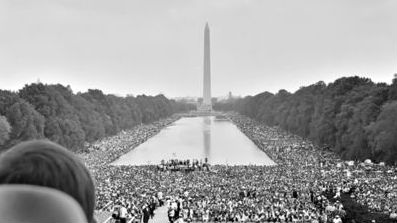How to Speak Like MLK Jr.

It wasn’t until 6th grade that I recall first hearing Martin Luther King Jr. speak. Mrs. Crume was my social studies teacher (interestingly enough, she was also the wife of Arthur Crume, frontman for the legendary Soul Stirrers). She made my classmates and me listen to a recording of King’s “Dream” speech, and I’ve listened to at least one of his speeches at least once a year ever since. And—whether it was 1983 or today—they still give me goose bumps.
King was a magnificent orator, and a great persuader. Yes, the latter was true because of the former, but not entirely. And, yes, King was blessed with a silver tongue that could turn a phrase more eloquently than most. But King also commanded attention, projected authority, and exuded credibility by cultivating a few persuasion tools. They are practices even those of us not so naturally gifted in the language and oratorical arts can nurture, in our efforts to move people for social good.
Any of King’s speeches amply demonstrate this; but I’ve chosen a brief clip from his final prophetic speech, delivered April 3, 1968, at Mason Temple in Memphis, Tennessee.
These three minutes of King’s final words demonstrate three key principles about how to effectively package and deliver an influential message.
—Don’t just speak, make music. Music is made from melody, a conjunction of pitch and rhythm resulting in a satisfying harmony. You can hear it in King’s words here. “Maybe I could understand…” sets the pitch. “But somewhere I read…” creates a syncopated rhythm. They form a two-part harmony that builds to a crescendo that—if you don’t fight it—lifts you right up out of your seat. Music moves us. It is emotional and visceral. It is persuasive.
—Be the master of your own face. Credibility is essential. This type of sincerity, integrity and trustworthiness cannot be conveyed by mere words alone. You must show it in your face. Your words may tell people to accept what you say. But your face reveals whether you actually believe and mean it yourself. Any discrepancy between what your words declare and what your face exposes and your audience loses faith. When I watch King over the course of these three minutes I see a man whose face is consistent with his purpose. His message is tinged with justifiable anger and a biting tone. He’s telling America it has not lived up to its promises. He demands better, and he believes America can do better. His wide eyes and batting eyelashes, his occasional curled lip and cocked head, his clenched teeth and his just-at-the-right-time smile: they all paint an image of one who embodies the demands, expectations and hopes for a country whose future was set in the path of progress.
—Travel with an entourage. I say this only partly in jest. Being flanked by exemplars, as King is in his pulpit, as he always seems to be when addressing the public, conveys both authority and leadership. It also shows that people have enough faith in you to have your back.
If we can learn to move people the way music moves us; if we can exhibit the kind of credibility of manner that gains public trust; if we can speak with a sense of authority (even a little audacity), then we, too, might summon the persuasive power to challenge the nation’s conscience (or our community’s), motivate legions of allies (or just a supporter or two supporting a good cause) and change the world (or just our neighborhood).





